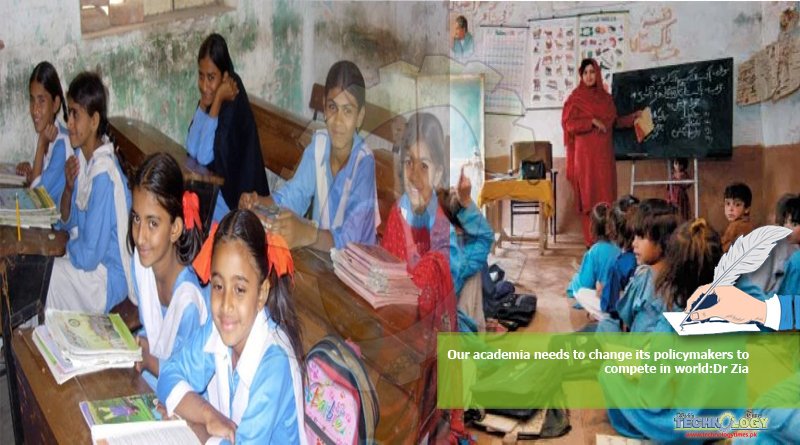Globally academia is continuously flourishing in every aspect of life as their academia has a strong decision-making body by specialists, not by politicians. Governance of higher education institutions around the world varies from nation to nation, ranging from direct and detailed control by the central government to public, politicians to the community, private profit-making enterprises, with many other arrangements in between. Our academia needs to change its policymakers to compete in the world.

Education is a road to development. It ensures individual and collective freedom from all walks of life. Pakistan, in spite of many ambitious education endeavors, still remains the lowest in development ranks in
the world. According to the Human Development Report, Pakistan ranks 136th with less than 50% literacy rate with 33.8% female and 47.18% male primary completion rate. The whole word is leading in educational infrastructure and we are continuously moving behind. Our academia needs to change its policymakers to compete in world.
Pakistan stands at the lowest in the ladder of allocation for education with less than 2.0 percent of the Gross Domestic Product.
Poor policy implementation in the education sector in Pakistan has exercised highly negative repercussions on all other areas of national life. Bukhari (1995) defines policy implementation to be the setting
goals and anticipating the consequences of the policy for the people for whom it is made.
It means that it involves a variety of actions such as issuing directives, decision making, assigning duties, and hiring personnel,
monitoring, and evaluating activities.
Implementation problems usually happen when there is a gap between the
stated policy and the achievement of the benefits of the policy by the target community.
This phenomenon has been facing Pakistan for a longer time.
The researchers as teachers, trainers, and administrators in education have been observing this sorry state of affairs in the country for a long time.
They observed that due to poor implementation of educational policies, the country has incurred heavy losses both in terms of material and human. After the lapse of sixty-five years of freedom, Pakistan is still struggling with a very low literacy rate in the south Asian region. One of the main reasons for this is a low priority for education in the country.
Pakistan is a developing country with a weak education system. Poor
policy implementation has been one of the major causes for this state of affairs. Although, this issue is a general phenomenon in all areas of national life yet it has been deeply affecting the education sector since the inception of the country in 1947.
Important questions need some patience to hear. Can a politician appoint, transfer or call an explanation of Vice-Chancellor? Universities are for the public not for employees. Is a politician devises the system, who designed the SOP? Who builds the infrastructure. Who hires and fires the faculty members who made UOS the state of families. Who granted the private universities degree-awarding universities.
These examples are negligible in numbers as compare to the actual figures. No institute lets the people intervene in the affairs. Who awarded Ph.D. to the nears and dears of the faculty members. Who deteriorated the quality of education.
The world is flourishing and we are going back in education as all the put up depend upon the policymakers and our policymakers are not up to mark in education.
There are many causes for poor implementation of educational policies in Pakistan. The main causes are the lack of continuity in
successive government policies, corruption, inadequate financial allocations, lack of training for human resource,
lack of visionary leadership, lack of political will on the part of successive governments, poor follow-ups, poor monitoring system, poor policy evaluations, centralized approach in implementation, lack of political stability and decaying institutional disciplines are the main causes that have plagued the process of educational policy implementation in Pakistan. Although the regularly stated policy goals in Pakistani education are sublime and ideal, yet, due to the above-identified reasons coupled
with weak institutional structures and frequent political interventions, the policies remain unfulfilled and do not
achieve the desired results. In light of this deep investigation, this article recommends some practical solutions to poor policy implementation in the country.
Firstly, that policymakers and policy implementers are needed to
be taken on board before, during, and after the policy formulation, implementation and policy evaluation stages.
This will generate commitment, strong will, motivation, and strong individual and institutional support for the implementation of the policies. Secondly, that increased budgetary allocation for educational projects may also improve the process of implementation if it is carried out with professional fervor, professionalism, and commitment by showing zero tolerance to corruption in all forms.
We not only need to revise our policies but also we have to change the criteria of academia policymakers.
